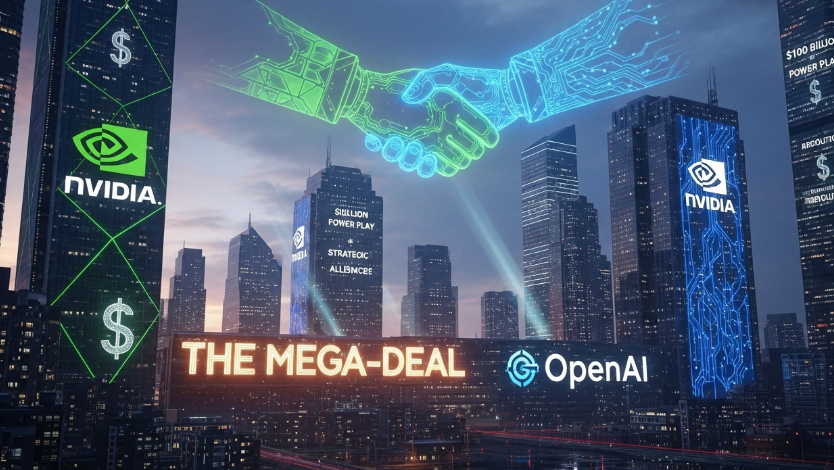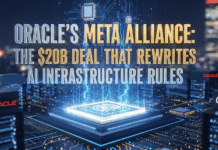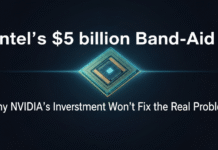Remember when your biggest tech decision was choosing between iPhone or Android? Well, buckle up, because we’re about to talk money that makes your monthly phone bill look like pocket change.
The Deal That’s Got Silicon Valley Buzzing
So you’re scrolling through your news feed (probably procrastinating, we’ve all been there), and you see that Nvidia just dropped $100 billion on a partnership with OpenAI. That’s not a typo – that’s more zeros than most of us will see in our bank accounts, ever.
But here’s why you should care, even if you can barely spell “gigawatt.”
What’s Actually Happening Here?
Here’s the deal: Nvidia is essentially bankrolling OpenAI (the folks behind ChatGPT – you know, that AI that’s probably written half your emails by now) to build data centers with enough power to light up New York City. We’re talking 10 gigawatts of pure computing muscle.
Translation for normal humans: They’re building the ultimate AI factories, and you’re going to benefit whether you realize it or not.
The Value Proposition: What’s In It for You?
Faster, Smarter AI Tools
Remember waiting 30 seconds for ChatGPT to respond during peak hours? Those days are numbered. This massive infrastructure investment means the AI tools you’re already using will become lightning-fast and significantly more capable.
More Reliable AI Access
No more “ChatGPT is at capacity” messages when you desperately need help with that presentation that’s due in an hour. This deal is essentially insurance against AI traffic jams.
Innovation You Haven’t Even Imagined Yet
OpenAI’s CEO Sam Altman hinted at “compute-intensive” products launching soon. Think of this investment as the foundation for AI capabilities that will make today’s tools look like flip phones compared to smartphones.
Why This Matters More Than You Think
700 million people use ChatGPT weekly. That’s nearly 1 in 10 humans on Earth. If you’re not one of them yet, you probably will be soon – and this deal ensures the experience won’t be frustrating.
But it’s bigger than chatbots. As Altman puts it, “Compute infrastructure will be the basis for the economy of the future.” In plain English: this isn’t just about better AI toys; it’s about building the digital backbone of tomorrow’s economy.
The Domino Effect You’ll Actually Notice
At Work: AI tools that can handle more complex tasks without breaking a sweat. Think less “Can you help me write an email?” and more “Can you analyze this market data and create a comprehensive strategy?”
In Education: More sophisticated AI tutoring that adapts to your learning style in real-time, making personalized education accessible to everyone.
In Daily Life: Smarter virtual assistants that actually understand context and can handle multi-step requests without making you want to throw your phone.
The Competition Is Heating Up (And That’s Good News)
This isn’t happening in a vacuum. Microsoft is spending $30 billion on data centers this quarter alone. Meta is building massive facilities in Louisiana. It’s like a digital arms race, except the weapons are designed to make your life easier.
Competition breeds innovation, and innovation means better products for you at competitive prices.
The Reality Check
Sure, there are concerns about an AI bubble (because apparently we humans are incapable of investing in new technology without going completely overboard). But here’s the thing: even if some companies overspend, the infrastructure they’re building will outlast the hype.
It’s like the dot-com boom – yes, Pets.com crashed and burned, but we still got Amazon, Google, and the entire foundation of the modern internet.
What This Means for Your Future
Short-term: Expect significant improvements in AI tools you’re already using within the next few months.
Medium-term: Prepare for AI capabilities that seem almost magical compared to what’s available today.
Long-term: We’re building the foundation for an economy where AI assistance isn’t a luxury – it’s as basic as having internet access.
The Bottom Line
This $100 billion isn’t just two tech giants playing with monopoly money. It’s an investment in infrastructure that will power the tools you’ll use to work smarter, learn faster, and solve problems you didn’t even know you had.
Whether you’re a tech enthusiast or someone who still calls every gaming console “a Nintendo,” this deal will impact your digital life. The question isn’t whether AI will change how you work and live – it’s how quickly you’ll adapt to the improvements coming your way.
And hey, at least you won’t have to foot the bill for this particular upgrade.








